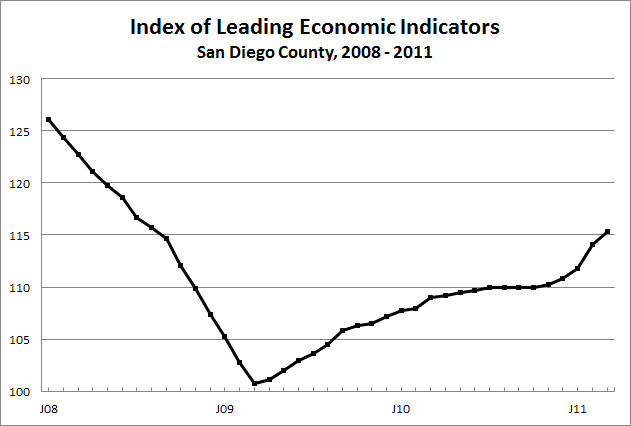|
Home
Leading Economic Indicators
Up Sharply in March
Note: The tentative release date for next month's
report is May 26.
April 28, 2011 -- The USD Burnham-Moores
Center for Real Estate’s Index of Leading Economic Indicators for
San Diego
County
rose 1.0 percent in March. The gain
was led by big increases in building permits, initial claims for unemployment
insurance, and help wanted advertising.
Local consumer confidence and the outlook for the national economy were
also up solidly. The only negative
was a small drop in local stock prices.
With March’s gain, the USD Index has now risen or been unchanged for two
full years.
The outlook for the local economy continues to be positive.
One area where things are picking up is the labor market, with 24,700
jobs added in San Diego Country between March 2010 and March 2011.
Sectors showing good job growth include administrative, support, and
waste services (up 6,500 year-over-year), professional, scientific, and
technical services (up 5,900), leisure and hospitality (up 4,800), and health
care (up 3,800). Construction (down
1,000 jobs year-over-year) and manufacturing (down 700) are the sectors that
continue to lag. While the gain is
welcome, the local economy still has a long way to go to fully recover.
At the March rate of job growth, it will take another four years to get
back to the same level of employment as the peak in December 2007.
The local unemployment rate remains high, having topped the double digit
mark now for 22 consecutive months.
Highlights:
Residential units authorized by building permits
finished the first quarter of 2011 up almost 72 percent compared to the same
period in 2010. The gain was due
exclusively to a surge in multi-family units authorized, which nearly quadrupled
(up 293 percent) compared to the first quarter of 2010.
Single-family permits actually fell by 12 percent during the period.
. . Both sides of the labor market were strong.
Initial
claims for unemployment insurance fell for the third month in a row,
which is a positive for the USD Index and a sign that layoffs are easing in the
local economy. On the hiring side of
the market, help wanted advertising has also increased for three straight
months. Despite both labor market
components being positive, the local unemployment rate rose to 10.2 percent in
March, up from 10.1 percent in February. . . Local consumer confidence
increased for the 11th month in a row in March.
So far, consumer confidence has not been affected by the big run-up in
gasoline prices, which has had a negative impact on confidence in the past. . .
Local stock prices fell for the first time in eight months.
This matched the behavior of most of the other market indexes, as all but
the Dow Jones Industrial Average were down slightly in March. . . The outlook
for the national economy continues to be positive as the national Index of
Leading Economic Indicators was up for the ninth consecutive month.
But the advance estimate of GDP growth for the first quarter of 2011
showed the national economy growing at only a 1.8 percent annualized rate as bad
weather and disruptions from the earthquake and tsunami in Japan
negatively affected the economy.
This is down from the GDP growth rate of 3.1 percent in the fourth quarter of
2010.
March’s increase puts the USD Index of Leading Economic
Indicators for San Diego County
at 115.3, up from February’s revised reading of 114.1.
Revised data for building permits and the national Index of Leading
Economic Indicators caused the previously reported record increase of 1.9
percent to be revised upward to an increase of 2.0 percent.
Please visit the Website address given below to see the revised changes
for the individual components. The
values for the USD Index for the last year are given below:

For more information on the University of San Diego's Index of Leading
Economic Indicators, please contact:
|